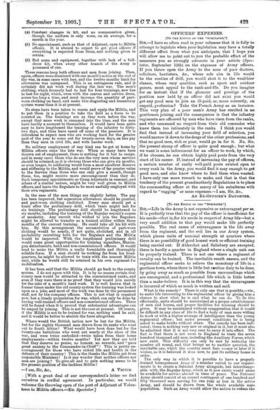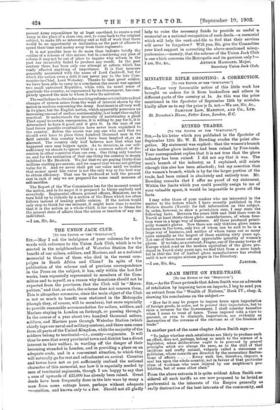[To THE EDITOR OP THE "SPECTLTOR.1 SIR, —Life in the Army
is not expensive or extravagant per se. It is perfectly true that the pay of the officer is insufficient for his needs—that is, for his needs in respect of Army life—but a very small addition to that pay would make life perfectly possible. The real cause of extravagance is the life away from the regiment, and the evil lies in our Army system, which places units of nominal strength at quarters where
there is no possibility of good honest work or efficient training being carried out. If Aldershot and Salisbury are excepted, there is hardly a quarter in England where a single unit can be properly trained. There is not one where a regiment of cavalry can be trained. The inevitable result ensues, and the regimental officer seeks to relieve the monotony of life in a garrison town, where there is little but routine duty to be done, by going away as much as possible from surroundings which are uncongenial, and a professional life which is little better than a make-believe. It is in this way that the extravagande is incurred of which so much is written and said.
What is the remedy? There is only one that is possible,—viz., to make life interesting to the regimental officer by giving him a chance to show what he is and what he can do. To do this effectually, units should be maintained at a proper establishment of men and horses, and proper facilities for training should be given. It may be maintained without exaggeration that it would be difficult in any class of life to find a body of men more willing to work or with a higher average of intelligence than the young regimental officer; under present conditions he is being asked to make bricks without straw. The remedy has been indi- cated ; there is nothing very new or original in it, but it must also be admitted that it is not very easy to carry it into effect. The fact is that there is not room in England to train the seven hundred thousand odd men, including the Auxiliary Forces, which now exist. This difficulty can only be met by reducing the number all round, and that brings us to another question, the inevitable one, which the country must face sooner or later if it wishes, as it is believed it does now, to put its military house in order.
The only way in which it is possible to have a properly trained homogeneous Army of a number suited to our require- ments is to create a National Army alongside, but interchange- able with, the Regular Army, which as it now exists would alone be available for service abroad in time of peace. The National Army should consist of an annual contingent of one hundred and fifty thousand men serving for one year or less in the active Army, and should be drawn from the whole available male population. Such an Army would allow the nation to reduce the The real failure to obtain far-reaching reforms or to initiate radical changes of system arises from the want of interest shown by the nation in matters concerning the Army. Sentiment is all very well in its place, but the English nation, which apparently possesses an increasing amount of surface sentimentality, is at heart thoroughly practical. It understands the necessity of maintaining a great Fleet equal to certain emergencies, it is willing to pay for it, it is determined to have it good, and it gets it. In the case of our land forces possible eventualities have never been explained to the country. Before the recent war any one who said that we should ever have to place three hundred thousand men in the field outside this country would have been laughed at,as an alarmist. The country, only half believes now that what has happened once may happen again. As to invasion, in our self- sufficiency we choose to ignore what is a common subject of dis- cussion in other countries than our own. One thing only touches HE, and for the realisation of that one thing the country is deeply indebted to Mr. Brodrick. We feel that we are paying thirty-four millions sterling per annum, and we suspect that we are not getting value for it. And we never shall get our value until we realise that money spent like water is not the only way or the best way to obtain efficiency. That can be produced at half the present cost in cash if only we are prepared for some small measure of
self-sacrifice. • The Report of the War Commission has for the moment roused the nation, and in its anger it is prepared to blame anybody and everybody. Regimental officers, general officers, Ministers, are in turn held up to ridicule by a section of the Press which too often follows instead of leading public opinion. If the nation would only stop to think for one moment, it might have time to realise that it is the nation as a whole which is far more to blame for the present state of affairs than the action or inaction of any one individual. present Army expenditure by at least one-third, to create a real Army in the place of a sham one, and, to come back to the original subject, to make life so interesting and so full of work that there would be no opportunity or inclination on the part of officers to spend their time and money away from their regiments.
It is not possible here to do more than indicate briefly the outline of a scheme of this nature, but in considering any plan of reform it may not be out of place to inquire why reform in the past has invariably failed to produce any result. In the past century there has been only one attempt at reform which has really effected anything of importance. It is that measure generally associated with the name of Lord Cardwell, but for which the nation owes a debt it can never pay to the late Com- mander-in-Chief, Lord Wolseley. Thanks to that great soldier, we have been able to carry to a conclusion the recent war against two small untrained Republics, while with its usual sense of gratitude the country, as represented by its Government, has com- pletely ignored the man to whom it owes its salvation.







































 Previous page
Previous page